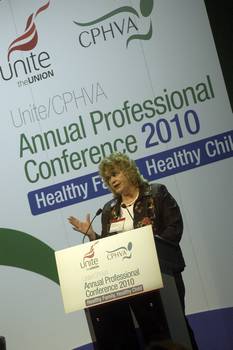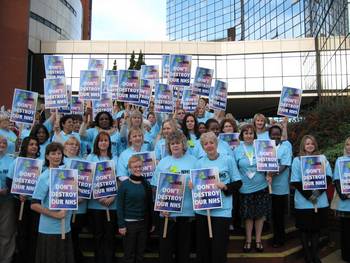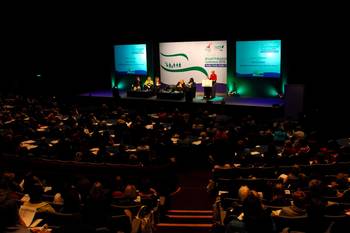Health Conference 2010
 By Carol Landry
By Carol Landry
USW International Vice President at Large
Day Three
Friday 22 October 2010
Over the past 3 days, we have been struck by the fact that healthcare workers in the UK and US share not only many of the same challenges, but also the same vision. Our current political and economic environments force healthcare workers to do more, serve more and give more with less: less funding, less time with patients, and even less people in the industry. It would be easy -- as Lord Victor Adebowale said today, to become mired in misery. But, quoting Pablo Neruda, Angela Mawle, Chief Executive of the UK Public Health Association, invited the group to, "Rise up with me against the organisation of misery."
Together, we must rise up. To close the conference, Dr. Mike Grady of the Marmot Review Team reviewed not only the above challenges we face, but also reiterated several themes of the conference of what we must do moving forward:
- We must break down the barriers we have built that separate nurses from health visitors and doctors and managers. We must come together as a united group of healthcare workers to advocate for better policies.
- We must influence policy whenever and wherever we can. David McDaid's economic case for preventative care coupled with our own experiences must be articulated to the Marmot Group, to the WAVE trust, to Anne Milton and to many others.
- We must advocate for a more preventative and community based approach to health. Trating symptoms and managing disease are not enough. Instead, we have to embark on a path of preventative and proactive care, which means we much resolve race and class inequalities, support physical and mental wellbeing in our families, and view health and welfare as a product of our home and community environment.
While our road is obviously filled with challenges, Olivia Giles, Founder of the 500 miles Charity gave us hope and inspiration to move forward with grit and grace. After losing both her legs and hands to an aggressive form of meningitis in 2002 and fighting to regain mobility and independence through the aid of prosthetics, giles founded her charity to support amputees and other disabled people in Malawi and Zambia.
Olivia inspires us all to even when, and especially when, faced with the most dire of circumstances, we must see challenges as opportunities to be the best advocates for ourselves and others.
Day Two
Thursday 21 October 2010
Mandy and I had many opportunities today to meet and speak with many of the delegates to the conference. During our discussions about the conference and the message we were receiving from the speakers and in the workshops, it became quite evident that the issues and challenges facing these workers are no different than what we are fighting in the U.S. and Canada. Much of the discussion also turned to the cuts announced yesterday here in England which will probably amount to the biggest spending cuts since the 1920’s. With half a million public sector jobs about to be lost, and others being asked to work shorter hours and take pay cuts, once again the working men and women will be the biggest losers as a result of the cuts. We talked about the attack on the middle class here in the UK and in North America and how important it is that we support each other wherever we can through Workers Uniting. The issues we face today, the fights we are fighting are now on a global scale and we can only attack them with a global union and with global solidarity among workers.
In her keynote address today, Professor Laura-Serrant Green, Professor of Community and Public Health, reviewed with the delegates the history of community nurses saying that at their inception, their role was to give relief to the poor in their communities and in their homes. She said it was the first time middle class women had a chance for paid work and went on to talk about the challenges these workers faced since the 1920’s and following those challenges to the present day. She said that the recent cuts will have a definite impact on people’s health and it was of the utmost urgency that they start to plan on how to deal with those negative impacts.
The next speaker, George Hosking, Founder, CEO and Research Coordinator, WAVE Trust, talked about early intervention with children and the role these community nurses played in their development. His message was that the work these community visitors do has such a direct impact on the future lives of the children they care for. He described their work as being “an investment in the future”. One delegate asked the speaker “How do we get the government to understand that any cuts to these early intervention programs will cost us more in the long run? How do we convince them to protect these programs and allow us to do the work needed in the communities?”
Mr. Hosking told the conference that there is currently an early intervention review going on and that they all needed to get their messages to the government; take the opportunity to help shape such programs will look like in the future; and tell the government what is going wrong with these programs in their local areas.
Quote from Obi Amandi, Lead Professional Officer, Unite the Union: “If we keep silent we will not be able to effect change – things will happen with or without us – and if we keep silent, any changes will not be best for us or our communities”.
 Anne Milton, MP, health minister said in her remarks that everything they are doing in her department is to get the best results for people. She talked about the community visitors as “being special people, with special skills who do special work”. When she talked about yesterday’s cuts, she said there was a political commitment to health workers and that there is money there to increase these workers by 50%. She said money was only part of the solution for health workers – she also said they have to find ways to get new recruits and said they would release a new recruit campaign next year. She said they are working with the Unite CPHVA to find out what is needed for better community health. There will be a new training program launched next year for community visitors – both new workers coming in and those re-entering. She said the government’s commitment to community visitors is very evident in their White Paper which will be released the beginning of December. She left the delegates by telling them that they are her eyes and ears on the ground.
Anne Milton, MP, health minister said in her remarks that everything they are doing in her department is to get the best results for people. She talked about the community visitors as “being special people, with special skills who do special work”. When she talked about yesterday’s cuts, she said there was a political commitment to health workers and that there is money there to increase these workers by 50%. She said money was only part of the solution for health workers – she also said they have to find ways to get new recruits and said they would release a new recruit campaign next year. She said they are working with the Unite CPHVA to find out what is needed for better community health. There will be a new training program launched next year for community visitors – both new workers coming in and those re-entering. She said the government’s commitment to community visitors is very evident in their White Paper which will be released the beginning of December. She left the delegates by telling them that they are her eyes and ears on the ground.
Day One
Wednesday 20 October 2010
Myself and Mandy Craig, attended the health sector workers conference in Harrogate, UK on behalf of the global union Workers Uniting. It was interesting to note that at 12:30, just prior to the first plenary session at 1:30pm, the UK heard the budget cut announcements were made by the coalition government. The announced cuts set the tone for the political and economic climate of the meeting and these were reflected in the speakers’ remarks and the questions/comments that followed from the delegates;
Both Gail Cartmail, Unite Assistant General Secretary and myself focused much of our words to conference on the NHS and Gail went into detail on the White Paper and what it could mean for the consumers as well as the workers in the industry. My message included an overview of the U.S. healthcare system; the abuses and discrimination by insurance companies and cautioned the delegates about the negative impact these insurance companies would have on their system if they were allowed to become service providers in the UK. I also talked about:
-
During the recent campaign for reform in the U.S., Workers Uniting helped by pushing the message that reforms to the private health insurance system would help workers at the bargaining table and was the morally right thing to do for the almost 50 million Americans without health insurance.
-
Sisters and brothers at Unite helped debunk mistruths and downright lies in the US about the Uk’s national health system; this helped us win an important step with the health insurance reform law President Obama recently signed: the Patient Protection and Affordable Health Care Act.
-
The global union is using its power in multiple nations to put pressure on insurers and politicians to do the right thing by putting people over profits.
I said: “when profits and business drive the system, costs go up and more emphasis is put on making money for CEOs than taking care of people”
 The next speaker was; David McDaid, Senior Research Fellow at the London School of Economics. He gave a presentation on how to best spend public money to maximize benefits to society. He made clear that “health is not a cost – it is an investment.” Moreover, early intervention in childhood well-being creates healthier, more productive (and happier) citizens.
The next speaker was; David McDaid, Senior Research Fellow at the London School of Economics. He gave a presentation on how to best spend public money to maximize benefits to society. He made clear that “health is not a cost – it is an investment.” Moreover, early intervention in childhood well-being creates healthier, more productive (and happier) citizens.
It was very clear to us that there have been huge economic cuts in this industry which have had negative impacts on those who are in the care of these care givers but also on the care givers themselves. We heard story after story about the necessity to do more with less negatively impacts not only the patients but the care givers as well. One comment was that they lost one health visitor every 36 hours.
Some quotes from interviews with ex-health visitors and the ongoing qualitative research project which asked the question: ‘what ever happened to our health visitor colleagues?
-
“At every moment, everything I did was questioned, challenged and criticized.”
-
“I feel damaged by the health service.”
-
“Most of what we do is paper exercise. We hardly see the children.”
-
“My identification and highlighting of unmet needs was perceived as a risk to the organization.”